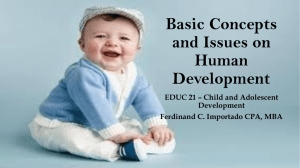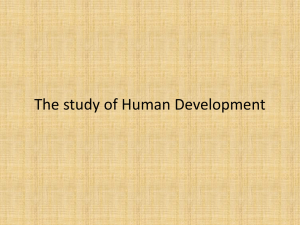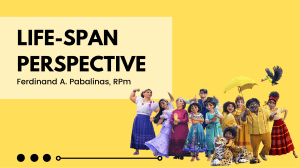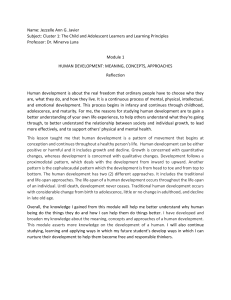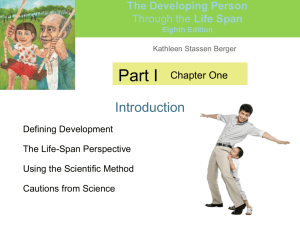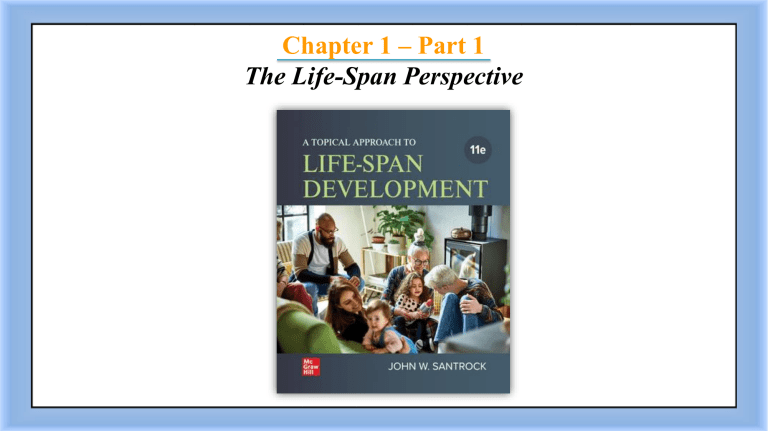
Chapter 1 – Part 1 The Life-Span Perspective Development Human Development: Scientific study of age-related changes in • Body • Behavior • Thinking • Emotion Influenced by biological and environmental factors Life-Span = oldest documented age Life Expectancy = Average expected age Life-Span Development Traditional view of development: Extensive change from birth to adolescence Little or no change during adulthood Decline in old age Wait… Life-span Perspective: Developmental change takes place throughout adulthood as well as during childhood Is lifelong, multidimensional, multidirectional, has plasticity, and is contextual Multidisciplinary - many fields of research Development is Multidisciplinary Biological Approaches • Behavioral Genetics, Evolutionary Psychology, Neuroscience • Cognitive Theories Piaget – Vygotsky – Information Processing Social-Emotional • Theories Erikson – Ainsworth – Bowlby – Skinner – Bandura Contextual Changes Normative Age-Graded influences Normative History-Graded Influences Nonnormative Life Events Similar for individuals sharing the same age group Shared by a specific generation Unique to the individual Normative Age-Graded Influences Normative History-Graded Influences Nonnormative Life Events – Start formal education (5-6 yrs) – Retirement – Puberty/Menopause – Great Depression – Assassination of JFK – 9/11 World Trade Center – Social Media – Illness, disability – Bullying – Family crisis (divorce, death) – Parents relocating Sociocultural Contexts and Diversity Culture: Enduring behaviors, ideas, attitudes, and traditions shared by a large group of people and transmitted from one generation to the next. Cross-cultural studies: Compare aspects of two or more cultures Sociocultural Contexts and Diversity Ethnicity: Characteristic based on cultural heritage, nationality characteristics, race, religion, and language Socioeconomic status (SES): A person’s position within society based on job, education, and money Gender: Characteristics of people as males and females Important to know that gender extends beyond this binary Contemporary Concerns Culture—Ethnicity Sex—Gender Health & Well-Being Parenting & Education SES Education Job Prestige Income Three Domains of Development Body, brain, motor skills, health Physical Cognitive Learning, memory, language, perception Social / Emotional Personal: motives, emotions, self Interpersonal: friends, family, relationships, childrearing Three Domains of Development Physical Cognitive Social / Emotional Nature of Development Developmental period: A time frame characterized by certain features 8 sequential periods with approximate age ranges • Used for the purposes of organization and understanding Development remains plastic throughout life-span: Capacity to change at any point Environment influences these changes • Example - nutrition, cognitive, and social stimulation Periods of Development Emerging Adulthood: Period of transition from adolescence to adulthood Age range expanded from 18-25 to 18-29 years of age Experimentation and exploration characterize the emerging adult • Identity exploration, instability, self-focus, feeling in-between, and the possibility of transformation Some propose - Early Adulthood: Age range of 30-45 years of age Delay of stable work and family patterns (getting married) Age and Happiness Is one age in life better than another? In the U.S., adults are happier as they age Psychological well-being increases after the age of 50 Older adults report having more positive emotional experiences than younger adults Wait… Studies show lowest levels of life satisfaction from 45-54 (middle age) • Varies across countries too! Conceptions of Age Chronological Age: Number of years elapsed since birth Biological Age: Age in terms of biological health Psychological Age: One’s adaptive capacities: to learn—think clearly—deal with stress—remain flexible Social Age (Age Norms): Social roles and expectations related to one’s age People with social relationships report being happier with their lives and are likely to live longer Developmental Issues Epigenetics: Bidirectional interchange between genes and the environment Impacts genetic expression Explains why one identical twin might have cancer and the other does not
